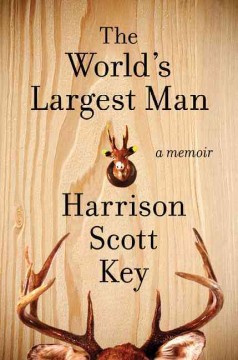by Andrew Hedglin
This is how all of Harrison Scott Key’s stories begin, according to the end of the first chapter of his tragicomic memoir about his father, The World’s Largest Man.
He doesn’t literally begin all his stories this way, at least not in writing, but I’d like to think he really does when he’s telling them aloud, whether to his children at bedtime or to a small group at a party in somebody’s kitchen.
It’s a little pause that gives opportunity to the storyteller to think about if he really does want to tell what he’s about to, and for us if we really want to hear it. In the moment of the pregnant pause between collecting his thoughts and dispersing them, lies the warning I first heard from the late, great Lewis Grizzard: “I don’t believe I’d-a told that”.
But that’s the difference between him and me, I guess, and I’m glad he committed to the story. And once he commits to telling, we also commit to the listening, because it’s impossible to resist the honest, hilarious, stylized absurdity that is about to follow.
Key begins by telling us stories about a man—shaped by a culture—that has no use for the art of storytelling. Our protagonist gravitates towards his mother, growing to prefer the quiet gentleness of her cooking and reading to the violence-soaked nature of his father’s obsessions: hunting, football, fighting, and farm work. Yes, even the miracle of (bovine) childbirth aims its roughest edges at Key, working on a neighboring farm, for free, at his father’s behest.
Did I say “gentleness” in that last paragraph? That’s not exactly what I mean.
Although sometimes uncomfortable with the more physical aspects of attempting (and often failing) to fulfill the expectations of Southern masculinity, he brilliantly unleashes his own aggression through his God-given talents for sarcasm and smart-ass-ery at every target available: his father in particular, the South in general, his rivals on the baseball field, potential bullies, his ne’er-do-well Savannah neighbors, later his wife (who is just as good at dishing it back), and even (and especially) himself.
His twin talents of insult and empathy lead him to say things which he then instantly regrets throughout all of his stories. That’s easy enough to let happen in conversation, or the dialogue of these stories, but leaving such joking truth on the page, after having enough time to consider what you’re saying? That’s a practiced and glorious art.
Curiously, he wounds his father mostly with disappointment rather direct verbal attacks, until about halfway through the book one day when his father beats our teen-aged narrator, half-naked and cornered on top of a washing machine, angrily with a belt. Key asks his father the question that has been building in his mind, and many of the readers’, throughout the narrative: “What the hell is wrong with you, old man? Are you crazy?”
Crazy can be a relative term, defined by both culture and circumstances. The second half of the books shifts the focus to his adulthood, leaving him a husband and a father himself in Savannah, Georgia. While he escapes the condemnation of the rural Rankin County mores he rejects, he examines the more unreasonable side of his nature in the face of challenges such as his wife’s pregnancy, his daughter’s potty training, tweaked-out neighbors relocation next door, and the very same home-invasion paranoia he began the book mocking his dad for.
The power dynamics do shift from a boy trying to connect with his different-natured father to a man trying to connect to his wife, the mother of his children, and sometimes partner-in-insanity.
Key has to learn which lessons to remember from his raising, and which ones to forget before it’s too late. It’d be easy to sell this book on Father’s Day as a exploration of a certain type of fatherhood, but there’s a lot to relate to whether you’re somebody’s child, parent, or spouse.
Mostly, I can guarantee if you make it to the book, you’re going to laugh a lot. You may even be tempted to tell a few stories about the things you remember from the harrowing experience of growing up.
Would you or I have the courage to celebrate and excoriate ourselves and even those we love as faithfully as Key has here?
Well…
Harrison Scott Key will be signing copies of this book at Lemuria on Thursday, June 18, at 5:00 p.m. and will be reading at 5:30.



Comments are closed.